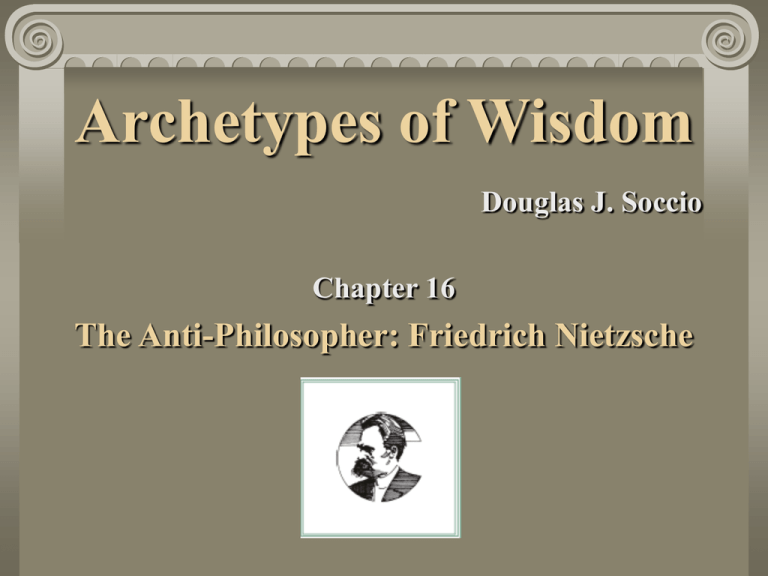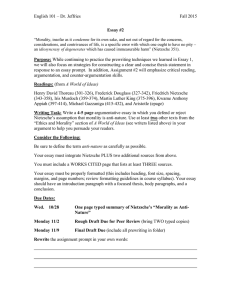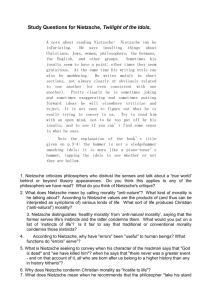Archetypes of Wisdom
advertisement

Archetypes of Wisdom Douglas J. Soccio Chapter 16 The Anti-Philosopher: Friedrich Nietzsche Learning Objectives On completion of this chapter, you should be able to answer the following questions: What is “modernity”? What is “pessimism”? What is “tragic optimism”? What is “Nietzschean perspectivism”? What is “nihilism”? What is the “overman”? What is the “underman”? What is slave morality? What is master morality? What is Ressentiment? Modernity Nietzsche saw himself as the first to recognize the symptoms of a profound sickness at the core of modernity. Modernity refers to the historical period of the nineteenth and twentieth century nation-states and to a corresponding set of cultural conditions and beliefs dominated by Enlightenment ideals. Modernity includes faith in science, objective truth and rationality; expectations of inevitable progress; capitalism, urbanization, and large-scale industrial enterprise; mass literacy, media, and culture; political democracy; and secularization. Modernity and God Nietzsche saw himself as the first to recognize the symptoms of a profound sickness at the core of modernity. His most famous (or infamous) pronouncement that “God is dead” is part of his assessment of the decadent condition of the modern age. The Outsider Perhaps no philosopher of modern times has provoked as much controversy as Friedrich Nietzsche (1844-1900). One of a handful of philosophers who can be called “bestselling” authors, Nietzsche’s work has a confrontational style that is both exhilarating and disturbing. Nietzsche was born in the Prussian village of Röcken. His father, a Lutheran minister, died when he was four years old. Though he planned to follow in his father’s footsteps, in his late teens he began to lose his faith. At twenty, he entered the University of Bonn, and though he tried his best to fit in, he always had the feeling of being an outsider. Introduction to Philology Nietzsche left Bonn and enrolled at the University of Leipzig. There he had the good fortune to meet Prof. Friedrich Ritschl, who recognized Nietzsche as a brilliant scholar Ritschl kindled in him a passion for philology – the study of classical philosophy and literature. However, despite his academic success, he had become a lonely man. Schopenhauer’s Pessimism While in this state, he came across the work of Arthur Schopenhauer (1788-1860), who argued that life was nothing more than a constant will to survive. Known as pessimism, the belief that life is disappointing and that our only hope is through detachment and withdrawal, Schopenhauer’s philosophy found an enthusiastic audience in Nietzsche, who said, “Here I was a mirror in which the world, life, my own mind were reflected in fearful grandeur.” Beyond the Academy Paradoxically, Schopenhauer’s pessimism invigorated Nietzsche. In 1868, Ritschl recommended him for a chair in classical philology. Nietzsche was only twenty four, but the university hurriedly conferred the doctorate on him, and he was appointed professor. Despite noble intentions, he was not a particularly effective lecturer, and fewer and fewer students attended. He did not socialize well, and the academic routine drained him. Just ten years later, he resigned, citing ill health, and was granted a pension. This enabled Nietzsche to break free from the confines of academic scholarship. His greatest work was accomplished in the ten-year period following his retirement from teaching (at age thirty-four). Tragic Optimism Around 1870, Nietzsche became intrigued with Darwinism and, using the idea of evolution, transformed Schopenhauer’s pessimism into his own unique doctrine of overcoming. Now thinking of retreat and renunciation as weak-willed and decadent, he came to believe that the solution was tragic optimism, the sense of joy and vitality of someone who neither shrinks from struggle nor struggles blindly. Such a person overcomes pessimism without retreating into lies about ultimate meaning or purpose. The tragic optimist imposes meaning on a meaningless universe and overcomes his or her own innate fears and weaknesses. Zarathustra Speaks Nietzsche came to see himself as the prophet of a healthier morality so far beyond conventional values that it required a “revaluation of all values.” He spoke of “doing philosophy with a hammer,” tapping on the great idols to see which are hollow and then smashing them to bits. After a relationship with a young intellectual named Lou Salome (who later abandoned him), Nietzsche retreated to the Swiss Alps, where he produced his most famous work, Thus Spake Zarathustra (in 1885). Using the name of the ancient Persian prophet Zoroaster, Zarathustra is at once a great destroyer of false values and a creator of new and healthy values, announcing the next evolutionary type, the Übermensch, or the overman. Truth and Perspective Nietzsche followed Zarathustra with what many consider the two most coherent statements of his philosophy: Beyond Good and Evil (1886). Toward a Genealogy of Morals (1887). In them, Nietzsche’s purpose is clear: to destroy conventional morality and replace it with a higher “immoral” ideal. Nietzschean Perspectivism Nietzsche’s controversial status as a philosopher is due, in part, to the aphoristic style of these works, and in part to a form of relativism known as perspectivism. Nietzschean perspectivism is the contention that every view is only one among many possible interpretations (including that of Nietzschean perspectivism). Nietzsche adopts points of view, which he refers to as experiments, to prevent the reader from forgetting that they, too, have points of view. Attack on Objectivity Based on most modern philosophy, Nietzsche can be considered an anti-philosopher, a radical critic of foundational doctrines who rejects the absolute authority of reason. So the anti-philosopher rejects the possibility of a neutral stance or “perspectiveless” perspective. Instead of philosophical argument, then, Nietzsche offers an appeal to aesthetic sensibilities – to “justify life as an aesthetic phenomenon,” what he calls a “will to power.” If we have no chance of discovering objective truth, we will have to invent truths according to our individual needs. Truth then is seen as a function of physiology of the individual, rather than an objective fact derived from reason. The Will to Power Call it what you wish – objectivity, truth, or wisdom – Nietzsche says the single goal of science, religion, and philosophy is the exertion of power. It is “mendacious” for anyone to think of themselves as disinterested spectators capable of objective judgment. And Nietzsche equates such will to truth to the will to power. As Nietzsche says, “This world is the will to power – and nothing besides! And you yourselves are also this will to power – and nothing besides!” Those moralities which pretend to be objective, to be something other than a manifestation of the will to power, are sick, degenerate, and decadent. The Problem of Morality Nietzsche accuses modern culture of being moralistic: expressing moral sentiments that conflict with one’s behavior and equating those expressions with virtuous living. Being moralistic is a form of hypocrisy that Freudian psychologists refer to as reaction formation, an ego defense mechanism that attempts to prevent dangerous desires from being exposed by endorsing opposite types of behavior as “barriers” against them. In Nietzsche’s view, modernity is anti-life and anti-nature in this moralistic sense. Modern Christian moralities – and all are Christian – show symptoms of this “décadence,” this decay. “God is Dead” Nietzsche thought that such moralistic symptoms signaled the next level of evolution, the end of human history and the beginning of the overman. Since science and philosophy do not provide us with meaning, we create it. And, like it or not, religion does not provide salvation: As Nietzsche famously said, “God is dead.” Nietzsche and God Nietzsche meant that the idea of God has lost its creative force, its full power. The full extent has not yet been felt by the masses, who still believe that they believe in God. Yet if we dig deep into our own psyches, we will discover that our one true faith is in scientific and technological progress. Moreover, Nietzsche thought there is no turning back – God is dead, and we have killed him. We still use “the language of God” and worship, but falsely. And even though some of us may sense that the old religions are dying, we are unable to face the consequences of life without God. Nihilism According to Nietzsche, the death of God leads to nihilism. From the Latin word for “nothing,” nihilism refers to the belief that the universe lacks objective meaning and purpose. Without God, there can be no objective base for values. In a nihilistic universe, what determines what counts? According to Nietzsche, the answers are found in the subjective interests of individuals and groups. We choose systems and philosophies based on our sense of power, on which interpretation gives you and yours advantage over others. Slave Morality To control their superiors, members of the herd create slave morality, a value system based on guilt, fear, and a distortion of the will to power in which the characteristics of the inferior type are praised as virtues, while those of the superior type are condemned as arrogance. This morality is common among “merely human” types who cannot face being alone in a godless world, whom Nietzsche calls the underman (in German, untermensch). The underman turns to the group for power and, aware of its inferiority, resents all “higher types” and “elitist” value systems. This ressentiment is a sure sign of slave morality: trying to convince the powerful that they should protect the weak. Master Morality The overman and underman possess the will to power, but differ in approach. The overman expresses power openly and honestly, in a process of life-affirming self-creation. The overman creates a new code of values, a master morality, which looks only to that person for value. Unlike slave morality, it is an aesthetic code of honor, where value is defined in aesthetic terms. Terms such as noble, honorable, refined, and so on, express what is “good” and their opposites – shameful, vulgar, dishonorable, etc., express what is “evil.” Having overcome merely human resentment and selfloathing, the overman – living this master morality - enjoys being what and who he or she is. Amor Fati In the absence of God, Nietzsche says, we must redeem ourselves with the sacred Yes to life expressed through amor fati, the love of our specific fate. That is, we should delight that everything is exactly as and what it is. Through amor fati, we realize that we exist as parts of a complex whole that can only be precisely what it is and not otherwise. Wrote Friedrich Nietzsche: “My formula for greatness in a human being is amor fati: that one wants nothing to be other than it is, not in the future, not in the past, not in all eternity. Not merely to endure that which happens of necessity…but to love it. ” Discussion Questions What did Zarathustra mean when he said that God is dead and we have killed him? If as Nietzsche/Zarathustra insists, God is dead, why does belief in God thrive in today’s world? Chapter Review Key Concepts & Figures Modernity Pessimism Will to Power Tragic optimism Zarathustra Nietzschean perspectivism Anti-philosopher Moralistic Reaction formation Nihilism Overman Underman lave morality Ressentiment Master morality Amor fati Friedrich Nietzsche (18441900) Lou Salome (1861-1937 ) Arthur Schopenhauer (17881860)








